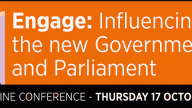Social Media and the Charity Sector – In darkness, spread light
Here's what we've decided to do about X.
Like many of you, we have been horrified and shocked by the appalling racist and Islamophobic riots and we are very clear that is what they were. We do not accept an argument that says there are underlying issues that caused riots. There are indeed underlying issues – but most people equally concerned about the cost of living, housing and other issues did not take to the streets, chant racist slurs or attack Mosques, people of colour, Police officers, and blame immigrants for their problems.
It is also true to say that the hate proliferated via social media platforms, primarily Twitter/X and Facebook amplified calls to violent action. This was further exacerbated by the owner of Twitter/X, Elon Musk, apparently supporting the violence we saw on our streets. And this is deeply concerning.
We have a social media strategy which includes these platforms, although part of that strategy is to focus more on LinkedIn than on Twitter/X or Facebook and other platforms. But like many of you, we have paused again to reflect on our use of social media in general and these platforms in particular.
We decided to stay. And here is why.
In considering our use of the platforms we looked at our audience, our reach and our impact. It is clear to us that our audience is primarily charities and their supporters who engage and interact with us very positively, and the things we are saying and doing get spread widely, as is also the case for other charities.
It was also noticeable that for all the hate on Twitter/X and Facebook, there is also a huge wave of positive engagement. Indeed, many of those affected by the riots, and the charities that support them, received an enormous amount of love and support via the same platform that spread the hate.
In a way, we see it partly as resistance to hatred, as leaving could potentially give voices of hate more power and create an echo chamber of conspiracy.
So whilst we were tempted to leave, after considerable thought we felt that leaving would cause more harm to us and the sector than staying. It’s not just charities on these platforms, it’s politicians, journalists and influencers, as well as a large proportion of the world and the people we serve. It’s a central forum that even governments don’t want to leave. And for all the negativity and hate – there is also a great deal of love and goodness on display. And as a charity, we felt we needed to put our beneficiaries and service users at the heart of our decisions, who are not leaving these platforms in droves.
The truth is no matter where we go as charities, we’ll always be followed by corporations and people who go against our ethics and values. This is new territory for us all, especially social media managers. We’re all navigating the complexities of the internet and its development through modernity, and there is always nuance to our choices of when and how we use these platforms.
Our advice to social media managers, leadership teams and trustees is to take time to assess your strategy and try not to be reactionary. Start with your cause and your beneficiaries and let that guide your decision.
We are clear that this is not an easy decision for charities to make and we respect your decisions whatever they are.
But for us, we have always believed that charities reach into the darkness to spread the light and leaving these platforms would only increase that darkness.
Good luck in your deliberations and remember that there are charities that you can amplify and support who are putting the work into reducing discrimination and hatred. Take a look here.


